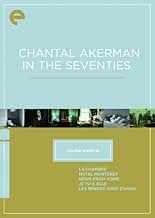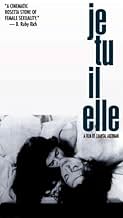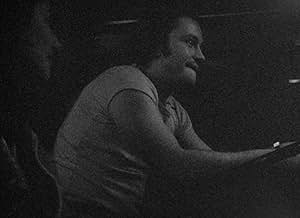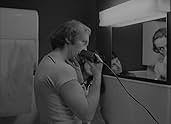Je tu il elle
- 1974
- 1h 26min
"Je" è una ragazza rinchiusa in una stanza volontariamente. 'Tu' è la sceneggiatura. "Il" è un camionista. "Elle" è la ragazza."Je" è una ragazza rinchiusa in una stanza volontariamente. 'Tu' è la sceneggiatura. "Il" è un camionista. "Elle" è la ragazza."Je" è una ragazza rinchiusa in una stanza volontariamente. 'Tu' è la sceneggiatura. "Il" è un camionista. "Elle" è la ragazza.
- Regia
- Sceneggiatura
- Star
Recensioni in evidenza
As a fan of long static shots I might not have had as big trouble as some others seems to have had. But the beauty of the imagery was minimal. And the lesbian love scene in contrast less grey felt not only dead but entirely inhuman and distant.
The 30 minute opening act was though it's many attempt of humor more or less dull. Her inner dialog struck me as somewhat silly rather than funny, interesting and deep. My interest grew during the second act, which is more dialog driven than the first and the last.
If anything this is a revolt against form. And I can in some sense appreciate it for this. Anything new or different will obviously create some interest and start some sparks. But Akerman did not manage to bring me in with this one.
Je, Tu, Il, Elle tells a story of a woman under the verge of a nervous breakdown. She just had been broken up with. Unable to literally move, she begins a slow journey to healing. In between, she eats a pack of sugar, begin a handy relationship with a driver she'd hitchhiked with and ultimately returns to her former lover's embrace.
A very interesting film. I always hear about Akerman when I reading about top women directors. But She has always been elusive since reports about her works describe it as minimalistic, repetitive and still. Things I tend to have reservation, but this is a RESPECTED DIRECTOR in bold letters.
This film proves that acclaim.
Everything is such a choice but it works. Directing and acting in what seems to be a very introspective and highly personal work, with all the bared. Quirky yet smartly written narrative that is complimented by her marvellous camerawork,and lighting. Everything here just is in full gears. She was able to encapsulate the trapped feeling of being depressed in such a tight package without any preachiness. And for a slow cinema style, she knows when to shift gear and engage her audience.
I am very excited to watch her other works.
Overall, highly recommended.
The first-person narration we hear would be the Je, the images of Je that we see in response to the narration would be the Tu. Il and Elle would be the two sexual relationships that Je maintains in the second and third parts of the film.
The first part shows an interest in confronting two modes of narration, auditory and visual, exposing curious discrepancies. Akerman seems as if she wants to show the inherent discrepancies between the subjectivity and the needs of recited verbalization and those of cinematic visual narration.
There is a sense of necessity, of complete justification in the minimalist artistic approach adopted, totally in agreement with the content. And the innovative and experimental nature is beyond doubt.
Another thing is whether these contents convince us or not. The truth is that it is enormously difficult to interpret what we are seeing, or the implications that the director wants to assign to them.
For example, in that first part, we do not understand the behavior of the protagonist (Je, and even more Tu), and there does not seem to be an attempt to justify it in any way (depression, existential crisis or any of those things). She is simply a young woman who seems idle and bored and who at some point casts an intelligent and knowing look at the camera. Like the rest of the characters that will appear, she does not earn our sympathy nor does she intend to, rather she seems to convey a proud superficiality that makes us uncomfortable. The girl tells us that she has not left her room for almost a month, feeding exclusively on sugar, but misteriously maintaining her full physical condition. We see her nonchalantly writing some letters while she puts the spoon full of sugar in her mouth again and again. The most we can say is that Chantal Akerman has no idea what it is to paint a flat, or the nutritional needs of a person. At a certain moment it snows (by the way, Akerman doesn't pay much attention to these technical aspects...), but the girl walks around the room naked without the slightest shivering.
The second part begins with the girl who finally decides to leave home to visit a girlfriend. While hitchhiking, she is picked up by a truck driver with whom she begins to become sexually intimate, although there is hardly the slightest conversation between them. We see them eat together in a restaurant while watching television, or have a beer without starting any conversation. But in any case, the young woman feels attracted to the boy enough to masturbate him and then listen to his confidences regarding his family relationships and his increasingly uncomfortable sexual obsessions.
The third part begins when the girl arrives at her destination, her friend's house. Once again the meeting turns out to be cold and the behavior of the two young women capricious. If there are tensions between them, they seem as emotionally superficial as their desires, and entirely physical. Little by little they dedicate themselves to a silent mutual seduction, and (as we think should usually happen to them), after the apparent initial irritation, they smooth things over and end up sleeping together. The sex scene is a mixture of Greco-Latin wrestling, display of sexual positions and artistic recreations of unknown ancient marble groups in motion.
As insubstantial as in everything else, the next morning, the young woman gets out of bed and abandons her friend without even the slightest comment, we understand that to spend another month eating sugar in her room.
An inmensely interesting film, disruptive in showing the artistic posibilities of radical minimalism in plot and style, experimental in its rhythm and innovative in some of its themes, to show us an attitude towards life that does not seem to go beyond a very basic and inconsequential hedonism.
The young director seems here to be playfully in accordance with this attitude towards life.
Lo sapevi?
- QuizThe film was ranked joint 225th in the Sight and Sound critics' poll of 2022.
- Citazioni
Truck-driver: You see, this is what matters. Move your hand. Slowly. Not so fast. Up and down. Slowly at first, then a little faster. I can feel it. It's getting warm. It's getting harder. It's filling up. Now the heat comes - inside and out. Slowly. It's gonna get real big and burst its skin. You obey, but you're afraid. You think it's wrong. Stroke it faster. Faster. Keep going. You can feel it coming. Go on. Go on. Slowly. That's right, up and down.
[Groans]
Truck-driver: It came in little waves. I'm gonna put my head on the steering wheel.
- ConnessioniFeatured in Fabulous! The Story of Queer Cinema (2006)
- Colonne sonoreNous n'irons plus au bois
(uncredited)
Traditional French
Lyrics by Madame du Pompadour
Music from the Gregorian 'Kyrie' of the "Mass of the Angels"
I più visti
- How long is I, You, He, She?Powered by Alexa
Dettagli
- Tempo di esecuzione
- 1h 26min(86 min)
- Colore
- Mix di suoni
- Proporzioni
- 1.37 : 1
















